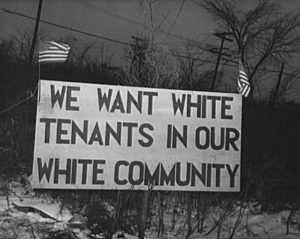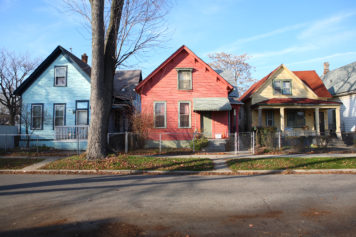
The country has witnessed the devaluation of Black lives by the justice system and the lack of value placed on Black art, but it turns out that even Black presence has been devalued to nothing more than an annoyance that slashes property values.
The concept was introduced decades ago.
In 1934, Homer Hoyt wrote a dissertation that ranked various races by their “desirability.” To no surprise, Black and Hispanic people were ranked at the bottom of the hierarchy. Eventually, such a scale was injected into the real estate market and Black people, regardless of socioeconomic status, were quickly being seen as a nuisance and a landlord’s worst nightmare.
White flight took hold quickly and wherever Black residents went, white residents were sure to flee.
“If the entrance of a colored family into a white neighborhood causes a general exodus of white people, such dislikes are reflected in property values,” Hoyt wrote, according to Slate.
That ideology of a “white neighborhood” being good and a “Black neighborhood” being bad is at the root of discrimination in the housing market. A 2008 survey helps quantify this.
The General Social Survey found that 20 percent of all white people who participated in the extensive survey believed their ideal neighborhood would have only white residents. Another 25 percent said their ideal neighborhood might have other races as long as they weren’t Black.
With lending practices by banks discriminating against Black would-be homebuyers, Black citizens were placed at a severe disadvantage. Their white counterparts were typically able to pay more for certain homes and the desire to push Black residents out of particular areas was officially sparked all across the nation.
As previously mentioned, America is a country rooted in the concept of capitalism. Nothing seems to be praised more than the dollar, so when white homebuyers and renters expressed a clear interest in forking over more cash to be in an area with no Black neighbors, racially discriminatory business models flourished.
Consider the disconcerting tale from one New York landlord recently explored by New York magazine. He has formed a profitable business off conniving Black residents, promising them money for their homes in foreclosure. While he gave the money to most of the residents, he admitted that it was usually lower than the amount he promised them. Once he managed to talk the Black residents into moving out, he began hunting for white residents to move in.
“If there’s a black tenant in the house—in every building we have, I put in white tenants,” he told the magazine, who identified him with the pseudonym Ephraim. “They want to know if black people are going to be living there. So sometimes we have ten apartments and everything is white and then all of a sudden one tenant comes in with one black roommate, and they don’t like it.”
The landlord said he gets awful calls about new Black neighbors at his properties, even when they haven’t done anything to the other tenants. Their very presence is offensive enough.
“They see black people and get all riled up, they call me: ‘We’re not paying that much money to have black people live in the building,’” he added before laying out his own racial biases. “If it’s white tenants only, it’s clean. I know it’s a little bit racist but it’s not. They’re the ones that are paying and I have to give them what they want. Or I’m not going to get the tenants and the money is not going to be what it is.”

Landlords are even aware of their racial biases but when so many Black people have been financially crippled by discriminatory practices by banks and other manifestations of systemic racism, they don’t have the cash pull to compete with the white tenants that just want them out of the neighborhood.
To make matters worse, when Black people do finally obtain enough money to purchase their own home there is a bit of a “Black tax” that drastically reduces any wealth they might receive from buying a home.
“Most whites live in largely white neighborhoods, where homes often prove to be a better investment because people of all races want to live there,” the Washington Post explained. “Predominantly black communities tend to attract a narrower group of mainly black buyers, dampening demand and prices, they say.”
This means that even when a neighborhood is full of wealthy Black residents, the value of the neighborhood diminishes simply due to the color of the residents’ skin. Therefore, Black people, even if they buy their way into an upper-class neighborhood, see the value of their investment diminish before they have even finished moving in.
“Put differently, they suffered a kind of tax that reflects the stigma associated with blackness, independent of wealth or status,” Slate writes. “It doesn’t matter how rich the inhabitants are. If a neighborhood is black, other groups don’t want to live there, hurting the value.”
It all serves as a disheartening reminder that even after decades of fighting for equality and pushing for the progression of the Black community, not much has changed from the days of separate bathrooms and water fountains.


